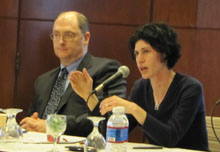Event
Panel: Climate coverage difficult, but journalists shouldn’t opt out

March 4, 2010 — Not so long ago it appeared that a U.S. cap-and-trade bill was well on its way to becoming reality. But then came the “climategate” emails and increased political opposition, particularly in the Senate, to taking action. While public worries over the impacts of climate change had once been climbing, they’ve since fallen to levels lower than they were 20 years ago.
This was the context of “Climate Policy and Politics: Covering Conflict in the Capital, Copenhagen and Beyond,” a discussion panel featuring Eric Pooley, a former Shorenstein Fellow and current deputy editor of Bloomberg.com‘s BusinessWeek, and Juliet Eilperin of The Washington Post. Other participants included Cristine Russell and Henry Lee of the Belfer Center’s Environment and Natural Resources Program and Alex S. Jones of the Shorenstein Center.
While Pooley and Eilperin are deeply engaged in the issue of climate change, both described the difficulty of trying to cover the issue. “It’s very hard [to pitch to editors] when it’s unclear where we’re going [politically],” said Eilperin, who, among other duties, writes the “Post Carbon” blog. And if it’s difficult to get editors to back stories, with a constantly shifting policy perspective “it becomes very confusing to readers.”
Another factor for Eilperin was the “very mobilized constituencies” of today. Every climate-related story is “bombarded” with responses, she said, many from skeptics. While she said she worked to always address readers’ concerns and challenges, such questions take away from her ability to report larger stories. At the same time, Eilperin said, it was important for journalists not to “opt out” and allow those with an agenda to dominate the conversation.
Pooley said that he had once hoped that the Copenhagen climate conference would lead to “at least the tentative first step” toward cap and trade. Instead, little if anything was accomplished. And while he had once felt that the only remaining question was what we should do about climate change, even that seemed to have changed. “You see debates on CNN on whether climate change is real or not, and you sort of pinch yourself and ask yourself, ‘What year is this?’” he said.
When it came to where responsibility lay, there was no lack of candidates. Pooley, an editor at BusinessWeek who had spent two years working on an upcoming book, The Climate War: True Believers, Power Brokers, and the Fight to Save the Earth, said that “expert coverage is hard to come by.” Science is “often a temporary beat that a business reporter is thrown into. He’ll handle it like it’s just another bill.” He also described the U.S. Senate as “dysfunctional for many, many reasons.” Business opposition, while decreased, has remained, and is often formidable.
The climate-action community also deserved some responsibility, Pooley said, for its strategic decision to consider the science settled: “In hindsight I fear that they ceded the playing field to the skeptics,” a big mistake at a time when “roughly a quarter or a third of the country is persuaded that this just isn’t real.”
When asked by moderator Alex Jones if news organizations could turn around public opinion on climate change the same way they had on the war in Iraq, neither Pooley nor Eilperin was optimistic. In Iraq, proof was easier to come by, Pooley said — the weapons of mass destruction that the Bush administration had warned about simply weren’t found. “What was there was American soldiers being shipped home in body bags,” he said, and that made it possible to get the public to reverse course.
Catastrophic weather events clearly linked to climate change could have that effect, Eilperin said, pointing to the “thousand-year drought” in Australia that put the issue front and center on that nation’s agenda. “Can the press alone do it, I don’t think so,” she said, “but in conjunction with other facts, yes.” She also asserted that stories highlighting the role of corporations in opposing climate action have the potential to shift public opinion.
This article was written by and photos were taken by Leighton Walter Kille.